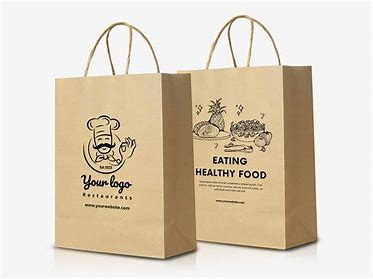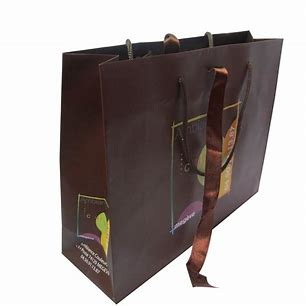Content Menu
● Environmental Benefits
● Durability and Strength
● Versatility in Use
● Aesthetic Appeal
● Safety and Health Considerations
● Cost Considerations
● Social Responsibility and Consumer Preferences
● Regulatory Trends
● Conclusion
● Frequently Asked Questions
>> 1. Are paper bags really better for the environment than plastic bags?
>> 2. Can I reuse a paper bag?
>> 3. Do paper bags have any health risks associated with them?
>> 4. Are there any downsides to using paper bags?
>> 5. How should I dispose of my used paper bags?
In recent years, the conversation surrounding environmental sustainability has intensified, leading to a significant shift in consumer behavior. One of the most notable changes is the increasing preference for paper bags over plastic alternatives. This article will explore the numerous benefits of using paper bags, focusing on their environmental impact, practicality, versatility, and additional aspects that contribute to their growing popularity.

Environmental Benefits
One of the primary advantages of using a paper bag is its positive impact on the environment. Unlike plastic bags, which can take hundreds of years to decompose, paper bags are biodegradable and recyclable.
- Biodegradability: Paper bags decompose naturally in a matter of weeks to months, depending on environmental conditions. This rapid decomposition helps reduce landfill waste and pollution. When paper bags break down, they do not release harmful toxins into the soil or water supply, making them a safer option for ecosystems.
- Recyclability: Paper bags can be recycled multiple times. According to various studies, recycling paper reduces the need for virgin materials and conserves energy, making it a more sustainable option compared to single-use plastics. In fact, recycling one ton of paper can save 17 trees and reduce greenhouse gas emissions significantly.
- Renewable Resources: Paper is made from trees, which are a renewable resource. When sourced responsibly from sustainably managed forests, paper production can contribute to reforestation efforts and carbon sequestration. Sustainable forestry practices ensure that tree harvesting does not exceed growth rates, helping maintain ecological balance.
Durability and Strength
Contrary to popular belief, a paper bag is often stronger than its plastic counterpart.
- Load Capacity: A paper bag can carry heavier items without tearing or breaking. The thickness of the paper used in manufacturing determines its strength; thicker paper can support more weight. For instance, kraft paper bags are known for their durability and are commonly used in grocery stores for this reason.
- Sturdiness: Paper bags are designed with reinforced handles and gussets that allow them to hold their shape when filled with items. This design makes them ideal for carrying groceries, books, or other heavy products without fear of ripping. The added strength also means that consumers can reuse these bags multiple times before needing to recycle them.
Versatility in Use
Paper bags come in various sizes and styles, making them suitable for multiple purposes.
- Retail Use: Many retailers opt for paper bags as they can be customized with logos or designs, enhancing brand visibility while providing an eco-friendly shopping option. Retailers find that consumers often prefer shopping with paper bags as they convey a commitment to sustainability.
- Food Packaging: Restaurants and cafes often use paper bags for takeout orders. They are safe for food contact and do not leach harmful chemicals into food items. Many food businesses also choose paper because it allows for better breathability than plastic, reducing moisture buildup that can spoil food.
- Crafting and Storage: Beyond their primary use as shopping bags, paper bags can be repurposed for crafts or storage solutions at home. Creative individuals often transform old paper bags into gift wrap or decorative items for events.
- Promotional Items: Businesses frequently use paper bags as promotional items during events or trade shows. They serve as effective marketing tools while reinforcing a brand's commitment to sustainability.
Aesthetic Appeal
The visual appeal of a paper bag cannot be overlooked.
- Customizability: Businesses can easily customize paper bags with colors, patterns, and logos, creating an attractive packaging solution that aligns with their brand identity. Custom designs not only enhance aesthetics but also foster customer loyalty by making products more memorable.
- Perception of Quality: Consumers often perceive products packaged in paper bags as being of higher quality compared to those in plastic bags. This perception can enhance customer satisfaction and loyalty. The tactile experience of handling a well-crafted paper bag also contributes to a positive shopping experience.

Safety and Health Considerations
Using paper bags also presents several health benefits compared to plastic options.
- Non-Toxic Materials: Paper bags are typically made from natural fibers without harmful chemicals or toxins that can leach into food or beverages. This aspect is particularly important for consumers concerned about food safety and health risks associated with plastic packaging.
- Reduced Risk of Contamination: Unlike plastic bags that may harbor bacteria due to their non-breathable nature, paper allows for better air circulation, reducing moisture buildup and potential contamination. This is especially relevant in food service settings where hygiene is paramount.
Cost Considerations
While it is true that paper bags may be slightly more expensive than plastic ones initially, their long-term benefits often outweigh these costs.
- Longer Lifespan: Due to their durability, many consumers reuse paper bags multiple times before disposal. This reusability contributes to cost-effectiveness over time. Many people find themselves using these sturdy bags for various purposes around the home after their initial use.
- Marketing Advantage: Brands that utilize eco-friendly packaging like paper bags often attract environmentally conscious consumers willing to pay a premium for sustainable products. This trend has led many companies to adopt greener practices as part of their corporate social responsibility initiatives.

Social Responsibility and Consumer Preferences
As awareness of environmental issues grows, consumers increasingly prefer brands that demonstrate social responsibility through sustainable practices.
- Consumer Demand: A significant portion of consumers actively seeks out products packaged in eco-friendly materials like paper instead of plastic. Surveys indicate that many shoppers are willing to pay more for products that align with their values regarding sustainability.
- Corporate Image: Companies that prioritize sustainability through the use of paper bags enhance their corporate image and reputation among consumers. This positive perception can lead to increased customer loyalty and trust.
Regulatory Trends
Governments around the world are implementing regulations aimed at reducing plastic waste and promoting sustainable alternatives like paper bags.
- Legislation Against Plastic Bags: Many cities and countries have enacted bans on single-use plastic bags or imposed fees on their use as part of broader environmental initiatives. Such regulations encourage both businesses and consumers to switch to more sustainable options like paper bags.
- Incentives for Sustainable Practices: Some governments offer incentives or subsidies for companies that adopt environmentally friendly practices, including the use of recyclable materials like paper in packaging.
Conclusion
In conclusion, the benefits of using a paper bag extend far beyond mere convenience. They offer significant environmental advantages by being biodegradable and recyclable while providing durability and versatility across various applications. The aesthetic appeal and safety considerations further enhance their attractiveness as a sustainable choice for consumers and businesses alike. As society continues to grapple with the consequences of plastic pollution, embracing alternatives like paper bags represents a positive step towards a more sustainable future.
The shift towards using a paper bag reflects broader changes in consumer behavior driven by environmental awareness and social responsibility. By choosing sustainable options like paper over plastic, individuals contribute to reducing waste and promoting healthier ecosystems while supporting businesses committed to sustainability practices.

Frequently Asked Questions
1. Are paper bags really better for the environment than plastic bags?
Yes, paper bags are generally considered better for the environment because they are biodegradable and recyclable. They decompose much faster than plastic bags and do not contribute to long-term landfill waste.
2. Can I reuse a paper bag?
Absolutely! Paper bags are designed for multiple uses. Many people reuse them for grocery shopping or storage before recycling them.
3. Do paper bags have any health risks associated with them?
No, most paper bags are made from non-toxic materials and do not leach harmful chemicals into food or beverages.
4. Are there any downsides to using paper bags?
While they are more environmentally friendly than plastic, some downsides include higher costs and less water resistance compared to plastic.
5. How should I dispose of my used paper bags?
Used paper bags should be recycled whenever possible. If they are too damaged or contaminated (e.g., greasy food wrappers), they can be composted if local regulations allow it.
































